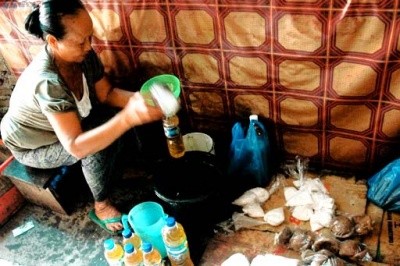Popular Reads
Top Results
Can't find what you're looking for?
View all search resultsPopular Reads
Top Results
Can't find what you're looking for?
View all search resultsIllegal UCO cartels hinder biofuel program: observers
Change text size
Gift Premium Articles
to Anyone
T
he illegal activity of passing off used cooking oil (UCO) as non-brand cooking oil (NBCO), which is allegedly becoming widespread on a massive scale in the country, may be disrupting the government’s biofuel program, observers have said.
According to the energy advisor of the British Embassy, Rizka Sari, illegal cartels are buying UCO from hotels and restaurants and then reprocessing it and mixing it with new cooking oil before selling it as NBCO.
"Instead of selling it for biodiesel, the restaurants and hotels are selling it to the illegal cartels," she said in Jakarta on Friday, underlining the need for the government to step in and abolish such practices.
With the current price of Solar (subsidized diesel) at Rp 6,700, biodiesel fuel companies would not be able to compete with illegal NBCO dealers, since their production costs reach Rp 3,000 for each liter of biodiesel fuel. It means they must buy UCO at about Rp 3,000 per liter, lower than the price that the illegal cartels offer.
Currently, she continued, the cartels are disrupting the UCO supply for biodiesel as they are buying up the UCO for Rp 6,000 per liter and selling it as NBCO for Rp 10,000.
"They even wait for the trucks carrying UCO. Before the trucks leave [for the biodiesel conversion facilities], they bribe the drivers to carry it for their purposes," said the executive director of the Leaded Fuel Eradication Commission, Ahmad Safrudin.
This practice was mostly found in Bali and Bogor, two areas that have UCO-to-biodiesel conversion facilities, he said. On Bali, the UCO cartels sold their illegal products to East Java, while the UCO cartels in Bogor pursued their UCO supply on another island, Makassar.
Transportation Study Institute chairman Darmaningtyas warned the illegal activity endangered consumers as the blended NBCO contained UCO’s bad residuals. The residuals are known to increase the risk of cancer and other diseases in the human body.
"Governments are undertaking efforts to prohibit NBCO distribution, such as the Bandung municipality that has forbidden the practice since February 2016, but Jakarta is not yet implementing it," he said. (ags)










